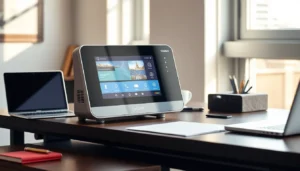Imagine cruising through the grocery store with a shopping cart that not only holds your snacks but also knows your favorite brands and helps you avoid impulse buys. Smart shopping cart technology is revolutionizing the way people shop, combining convenience with a dash of futuristic flair. These high-tech carts are like the personal assistants of the retail world, guiding shoppers through aisles and ensuring they stick to their budgets—no more accidental chocolate bar purchases!
Table of Contents
ToggleOverview Of Smart Shopping Cart Technology
Smart shopping cart technology transforms grocery shopping into a streamlined experience. These carts feature advanced sensors, artificial intelligence, and connectivity, enabling real-time data processing. Shoppers benefit from automated checkout processes, eliminating long waiting times at the cash register. By integrating barcode scanners and touchscreen interfaces, customers can easily track their purchases.
Personalized recommendations enhance the shopping process. Carts do more than just hold items; they analyze shopping habits and suggest products based on prior selections. This capability encourages shoppers to consider preferred brands while helping them stick to their budgets. Carts can provide alerts for sale items or discounts, prompting consumers to make informed purchasing decisions.
Navigation assistance is another key feature. Smart carts often include built-in GPS technology that guides shoppers to desired products within the store. This feature reduces time spent searching, making the overall experience more efficient. Additionally, some carts offer calorie information or nutritional data, empowering consumers to make healthier choices.
Security features also play a crucial role. Smart carts can monitor theft or unauthorized use, ensuring that retailers and consumers feel secure while shopping. Effective data collection contributes to understanding customer preferences and improving inventory management.
Incorporating smart shopping carts can revolutionize customer engagement strategies. Their deployment supports streamlined operations for retailers while fostering an enhanced shopping experience for consumers. As technology continues to advance, smart shopping carts are likely to evolve further, bringing even more innovative features to the forefront.
Key Features Of Smart Shopping Carts

Smart shopping carts incorporate cutting-edge technologies that significantly enhance the grocery shopping experience. These features streamline processes, improve customer satisfaction, and optimize store management.
Automated Checkout Process
Automated checkout systems eliminate the need for traditional registers. Smart carts utilize built-in barcode scanners that allow shoppers to scan items as they shop. Customers can see a running total of their purchases in real-time. This approach reduces long lines and wait times, promoting a seamless shopping experience. When it’s time to leave, the checkout is quick, resulting in easy payments directly on the cart’s interface.
Real-Time Inventory Management
Real-time inventory management empowers both retailers and shoppers. Smart carts can connect to store inventory databases, providing accurate stock information. Shoppers receive alerts if a favorite item is out of stock, allowing them to make informed choices. Retailers benefit from insights into shopping trends, enabling them to restock popular items promptly. Improved inventory tracking minimizes waste and optimizes product placement in the store.
Advanced Navigation Systems
Advanced navigation systems transform the way shoppers find products. Smart carts often feature integrated GPS technology to guide customers through stores efficiently. Shoppers can enter their shopping lists on the touchscreen interface, which then provides a mapped route to each item. This feature simplifies the shopping process, minimizing time spent searching for products while enhancing overall convenience in-store.
Benefits Of Smart Shopping Cart Technology
Smart shopping cart technology offers significant advantages to both shoppers and retailers. Enhanced efficiency and personalized shopping experiences emerge as primary benefits from this innovative approach.
Enhanced Shopping Experience
Smart carts enrich the shopping experience through personalized recommendations. By analyzing purchase history, these carts suggest relevant products, helping customers stay within budget. Real-time data processing ensures shoppers receive timely notifications about favorite items, improving overall satisfaction. Integrated navigation capabilities simplify the in-store journey. Shoppers can access mapped routes to locate products quickly, minimizing frustration. With automated checkout processes, customers avoid long lines, completing purchases smoothly. Touchscreen interfaces allow seamless interactions, making the cart a valuable companion during the shopping journey.
Increased Store Efficiency
Store efficiency sees substantial improvement with smart cart technology. Automated inventory management connects carts to live databases, enabling rapid notification of stock levels. Retailers gain insights into consumer trends through this real-time data, facilitating better stock management. Shopping carts streamline the checkout process, reducing labor costs and enhancing customer throughput. Carts tracking shopping patterns empower retailers to optimize store layouts based on popular items, fostering a more organized shopping environment. Enhanced security features deter theft and unauthorized use, promoting accountability and safety. Overall, smart carts improve operational procedures while enhancing customer engagement, benefiting retailers and consumers alike.
Challenges Facing Smart Shopping Cart Technology
Smart shopping cart technology faces various challenges that impact its full potential. Issues with technical integration and consumer adoption require attention for improved implementation.
Technical Integration Issues
Integrating smart carts into existing store systems poses significant challenges. Compatibility with current inventory management software remains a concern for retailers. Furthermore, maintaining robust connectivity in-store proves essential, as weak signals disrupt real-time data processing. Additionally, the cost of retrofitting stores may deter some retailers. Installing advanced sensors and software infrastructure requires substantial investment on their part. Effective solutions are needed to bridge these gaps and enhance overall functionality.
Consumer Adoption Barriers
Consumer adoption presents another barrier for smart shopping carts. Familiarity with traditional shopping methods leads to resistance among shoppers. Some customers may feel intimidated by complex technology, relying on employees for assistance instead. Additionally, privacy concerns arise as shoppers worry about data collection and usage. Users often hesitate to accept new technologies due to fears about personal information security. Addressing these concerns through effective communication and transparency will encourage broader acceptance of smart shopping carts.
Future Trends In Smart Shopping Cart Technology
Emerging trends in smart shopping cart technology focus on enhanced functionality and shopper engagement. Increased adoption of artificial intelligence leads to more sophisticated customer interactions. Companies develop models that utilize machine learning algorithms, offering tailored shopping experiences based on individual preferences.
Enhanced mobile integration is another trend driving innovation. Smart carts increasingly connect with shoppers’ smartphones, allowing for real-time notifications and updates. Shoppers can receive alerts when they are near sale items or when their favorite products are back in stock.
Data analytics play a crucial role in future developments. Retailers analyze aggregate data from smart carts to gain insights about consumer behaviors and inventory needs. These insights inform better product placements, promotions, and inventory management strategies.
Increased emphasis on sustainability drives design improvements. Manufacturers are exploring eco-friendly materials and energy-efficient systems to minimize environmental impact. Shoppers show greater preference for retailers committed to sustainability efforts.
Privacy-focused features also gain traction. As data collection raises concerns, new technologies aim to anonymize shopper data while still offering personalized experiences. Transparency in data usage fosters trust between retailers and consumers.
Finally, social shopping integration is likely to grow. Shoppers might see seamless integration with social media platforms, allowing them to share their shopping lists or get recommendations from friends. This interactivity enhances the shopping experience and builds community around brands.
Smart shopping cart technology is redefining the grocery shopping landscape. By combining advanced sensors and artificial intelligence, these carts not only streamline the shopping experience but also foster smarter purchasing decisions. With features like automated checkout and real-time inventory management, shoppers enjoy greater convenience and efficiency.
Retailers also stand to gain significantly from this technology. Enhanced operational insights and improved customer engagement contribute to better stock management and optimized store layouts. As challenges surrounding integration and consumer acceptance are addressed, the future of smart shopping carts looks promising. With ongoing advancements in functionality and sustainability, these innovative tools are set to revolutionize how people shop, making it easier and more enjoyable than ever.





